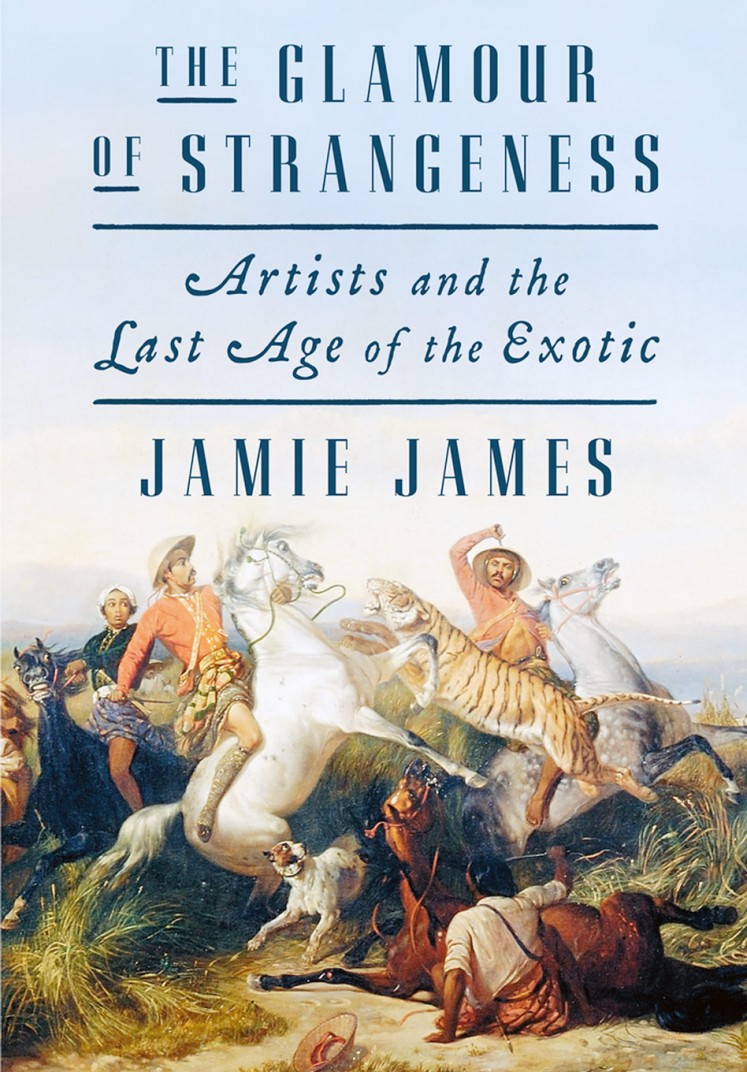Popular Reads
Top Results
Can't find what you're looking for?
View all search resultsPopular Reads
Top Results
Can't find what you're looking for?
View all search resultsJamie James: An exotic transplant
Jamie James, born and raised in Houston, Texas is not your typical Texan. He is not a soccer fan, enjoys sop buntut (oxtail soup) just as much as barbecue. Yet he wields a deft and perceptive pen that places him among the most talented expat writers living and working in Indonesia today.
Change text size
Gift Premium Articles
to Anyone
D
uring his long and distinguished multifaceted writing career, Jamie James has written fiction, biography, art reviews, travel articles, features and long-form criticism about a great variety of subjects.
After graduating from Williams College in Massachusetts, where he majored in art history, James moved to New York where he spent 20 years working as a freelance journalist and critic, including a stint as art critic at one of the most respected and prestigious magazines in the world, The New Yorker.
The recipient of a Guggenheim Foundation grant, James has contributed to Rolling Stone, The Atlantic Monthly, Condé Nast Traveler, National Geographic, The New York Times and Wall Street Journal, among other major publications.
In 1999, James resigned his post at The New Yorker and moved to Jakarta to devote more of his time to books.
Over the past 18 years, James has published five books, all but one of them about Indonesia, at least in part, and he continues to write about culture and travel for American magazines and newspapers.
He now lives in Lombok, West Nusa Tenggara with his partner Rendy, whom he met in 1995 while he was in Jakarta to profile the novelist Pramoedya Ananta Toer for The New Yorker.
When he began living and working in Indonesia more than 18 years ago, it took him a long time to get established.
The first five years was an exciting immersion in a new culture. Since he moved here, the global editorial universe has been turned upside-down. Freelance journalism has almost completely gone digital. Fortunately, Jamie had the loyalty of his publisher, Farrar, Straus & Giroux, in New York.
“There is no doubt that Indonesia offers a better style of life than toughing it out in New York,” he confided in me. “I’ve learned that I can do what I do from almost anywhere.”
Andrew and Joey: A Tale of Bali (Jamie James/File)Jamie’s first literary foray that involved Indonesia was Andrew and Joey, his first novel, published in 2000. This book was partly inspired by Samuel Richardson’s epistolary novel Clarissa, written in the 18th century. The story, told through emails, is set in modern day America and Indonesia. It’s a bittersweet tale about the head-on collision of a Western man with the culture of Bali.
His second novel, The Java Man, published in 2004 — a satire of global literary culture — centers on an Indonesian poet who upsets a coterie of traditionalists in a secluded English village. The mysterious stranger arrives in the gloomy community with jamu (traditional medicine) healing potions, a magic kris and bawdy epics drawn from ancient lontar, bringing a fascinating glimpse of an utterly remote world to rural England.
Jamie has also been successful writing non-fiction about the country.
In 2011, he published Rimbaud in Java: The Lost Voyage, about the great French poet Arthur Rimbaud who joined the Dutch Colonial Army in 1876 as an infantryman and sailed for Java, where he promptly deserted and fled into the jungle.
His latest book, The Glamour of Strangeness, focuses on transplants like myself. Two of the main subjects are Raden Saleh, the Javanese painter who found fame and fortune in Europe, and Walter Spies, the prodigiously talented German painter who lived in Bali in the years between the world wars.
I asked him what it is like writing a biography, as opposed to fiction. “Biography requires a tremendous amount of research, whereas in fiction there’s very little or none,” he says.
“In a novel, the characters almost write the book for you. When I was writing novels, I got so caught up in the characters’ voices and actions that I wanted to see how it all turned out. In a biography, you can’t say anything, no matter how trivial, unless you know it’s true. Or I can’t.”
Rimbaud’s voyage to Java in the 19th century, the subject of Jamie’s book Rimbaud in Java, is a case in point. As a mercenary soldier in the Dutch Colonial Army, this journey was one of the most mysterious passages in a life full of mysteries. Very little is known about the adventure. It’s such an unlikely adventure that in the early days of Rimbaud studies, some scholars thought it was just another of the poet’s extravagant tall tales.
Jamie started off trying to write a novel based on this episode of his life, but soon gave it up. “Most attempts at a fictionalized version of Rimbaud’s life have been pretty embarrassing, like Total Eclipse, the film starring Leonardo DiCaprio as the poet,” Jamie believed.
Rimbaud, whose life was even more amazing than his work, was too intriguing a character to portray on film. The poet created the prototype of the artist as rebel. Rimbaud is one of the very few examples of a child prodigy in literature.
There are several cases of 6 year olds composing symphonies, like Mozart and children who show an uncanny talent for mathematics or chess, but Rimbaud basically invented modern poetry by the age of sixteen. To say he was wise beyond his years would be a massive understatement.
His latest book The Glamour of Strangeness is an anthology of six mini-biographies of people who didn’t just go to an exotic place to live, but who immersed themselves in the new culture and made it their new home.
Jamie himself is one of the people he writes about in the book, making him well qualified to write about the subject. There are autobiographical sections at the beginning and end of The Glamour of Strangeness, describing his career as a travel writer, which led to his decision to live in Indonesia.
Jamie calls the self-exiles in his book “exotes,” borrowing a word from one of his subjects, Victor Segalen, a French poet who arrived in Peking at the end of the Empire and lived the life of a Ming Chinese poet-scholar.
The book started out as a dual biography of Raden Saleh and Walter Spies, then Jonathan Galassi, the editor in chief of Farrar, Straus & Giroux, said, “Why don’t you expand the scope?”
Jamie explains, “Paul Gauguin set the paradigm of the exote, and I had some things to say about him, so I started the book with his move to Tahiti. The other two subjects are Isabelle Eberhardt, a Russian-Swiss writer who converted to Islam and moved to Algeria, and Maya Deren, an American experimental filmmaker who went to Haiti to make a documentary about voodoo and ended up becoming a priestess of the religion.”
Finally, I was curious about what his writing life, remarking that he never seemed to let himself laze around before he started work on a new project. “I’m not romantic about writing. It’s a job. I write 1,000 words a day, or try to, until I finish the first draft. Then the real work begins — the editing and revision. After I finish a book, there’s a fleeting pleasure, but it doesn’t take long before I see how it could have been better.”













